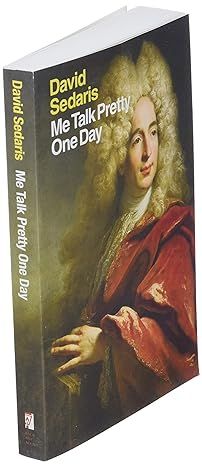


Me Talk Pretty One Day
4.3 out of 5
8,905 global ratings
Me Talk Pretty One Day, published in 2000, is a bestselling collection of essays by American humorist David Sedaris. The book is separated into two parts. The first part consists of essays about Sedaris’s life before his move to Normandy, France, including his upbringing in suburban Raleigh, North Carolina, his time working odd jobs in New York City, and a visit to New York from a childhood friend and her bumpkinish girlfriend. The second section, "Deux", tells of Sedaris’s move to Normandy with his partner Hugh, often drawing humor from his efforts to live in France without speaking French and his frustrated attempts to learn it. Prior to publication, several of the essays were read by the author on the Public Radio International program, This American Life.
In April 2001, Variety reported that Sedaris had sold the Me Talk Pretty One Day film rights to director Wayne Wang, who was adapting four stories from the book for Columbia Pictures with hopes of beginning shooting in late 2001. At the time, Sedaris commented, "It's just one of those things I had never considered. Like, 'What if I de-clawed a kitten?' But I like Wayne Wang a lot." He recommended Jack Lemmon to play his father and Elaine Stritch for his mother. Wang had completed the script and begun casting when Sedaris asked to "get out of it," after a conversation with his sister aroused concerns as to how his family might be portrayed on screen. He wrote about the conversation and its aftermath in the essay "Repeat After Me", published in Dress Your Family in Corduroy and Denim. Sedaris recounted that Wang was "a real prince. I didn't want him to be mad at me, but he was so grown up about it. I never saw how it could be turned into a movie anyway."
About the authors
David Sedaris
David Sedaris lives in Paris. Raised in North Carolina, he has worked as a housecleaner and most famously, as a part-time elf for Macy's. Several of his plays have been produced, and he is a regular contributor to ESQUIRE and Public Radio International's 'This American Life'.
David Sedaris is the bestselling author of the books Calypso, Theft By Finding, Let's Explore Diabetes with Owls, Squirrel Seeks Chipmunk, When You Are Engulfed in Flames, Dress Your Family in Corduroy and Denim, Me Talk Pretty One Day, Holidays on Ice, Naked, and Barrel Fever.
Read more
Reviews
Macaela
5
witty and silly
Reviewed in the United States on April 17, 2024
Verified Purchase
Loved this read, picked it for a girls trip to NYC. Read most of it between subway stops. Will read these short stories and essays to anyone willing to listen.
Lydia Dustin
5
Amazing book
Reviewed in the United States on March 28, 2024
Verified Purchase
The funniest book ever. If you haven’t read this book, order it now! You’ll laugh until you cry. He’s a genius.
Ivy
5
David Sedaris has figured it out
Reviewed in the United States on August 10, 2000
Verified Purchase
In his previous collections, Barrel Fever, Holidays on Ice, and Naked, Sedaris' works have been sometimes hilarious, sometimes disturbing and grim, and sometimes all three. His best works, though, were always the funny essays based on his own life. (Fortunately, he's weird enough that this works.) And in Me Talk Pretty One Day, he shows that he's realized where his strength lies. The first portion of Me Talk Pretty, prosaically named One, contains more of his reminisces about his family. These stories are often funny, usually with an underlying tension, and their conclusions are usually wry or bittersweet. "Go Carolina" is a perfect example of these, talking about Sedaris' years in speech therapy as a child, and suggesting that perhaps his parents, teachers, and therapists were trying to fix something other than just a speech impediment. Deux, the other half of the book, concerns Sedaris' life in France, especially his attempts to learn French. Most of the essays in Deux are truly hysterical. They're the kind of thing where, after a few minutes of reading, your eyes are tearing up from lack of oxygen and your loved one has awoken from a sound sleep (probably because the bed was vibrating with your laughter) and is threatening to call an ambulance or suffocate you with a pillow. Deux has attractions in addition to the humor in the stories. It's nice to see that Sedaris can write - and write well - about something other than his screwy childhood and screwed-up history. Sooner or later Sedaris is bound to run out of humorous anecdotes about his past, and Me Talk Pretty is an indication that when he does, he'll still have good stuff to write about - his present. In fact, if this book is anything to go by, Sedaris' works will only improve on that day - in the distant future, of course - when he puts the past in, well, the past. (Caveat: do not read this book in public places unless you enjoy looking like someone with a major nervous system disorder and a bronchial problem. Books like this are best enjoyed either by yourself or in the company of people who have to love you, no matter how strange you look.)
Read more
38 people found this helpful
Mark D. Walker
4
Author has become a humorist icon and his book is a fun read!
Reviewed in the United States on March 26, 2019
Verified Purchase
I’d heard enough about the author’s wit and humor to finally purchase one of his books. I didn’t realize it was a compilation of his short stories which was initially confusing but I found a number of them hilarious. Although he’s no Mark Twain, I found his insights and cultural euphemisms and political correctness helped lighten up my day. I can’t imagine him trying to convince family members to share some of the more outrageous stories about them. He’s teamed up with his sister Amy on several projects. She was brilliant when in one of his stories, she imitated a family friend and propositioned their father—making Sedaris one of the kings of parental grief giving. On the whole, the author’s childhood memories were quite entertaining although I bought the book for his cross cultural witticism and stories of how language—or a lack of understanding it can have dire and very humorous consequences. His insights into the French was entertaining and insightful although not as well developed as Sixty Million Frenchmen Can’t be Wrong: Why We Love France but Not the French by Jean-Benoit Nadeau and Julie Bartow. But I enjoyed his quips about French language:
Nothing in France is free from sexual assignment. I was leafing through the dictionary, trying to complete a home-work assignment, when I noticed the French had prescribed genders for the various land masses and natural wonders we Americans had always thought of as sexless, Niagara Falls is feminine and, against all reason, the Grand Canyon is masculine….I wonder whose job it was to assign these sexes in the first place….
The author has become incredibly popular with seven million copies of his books in print after being translated into 25 languages. He’s been on several late night comedy shows lately and he does stand-up comedy. He’s the author of an anthology of stories, “Children Playing Before a Statue of Hercules: An Anthology of Outstanding Stories” and his essays appear regularly in Esquire and the New Yorker. He’s been at it for a while—he became the third recipient of the Thurber Prize for American humor in 2001. Sadaris and his sister Amy, have collaborated under the name “The Talent Family” and have written several plays which have been produced at Lincoln Center. He’s also been nominated for two Grammys for Best Spoken Word Album ("Dress Your Family in Corduroy & Denim") and Best Comedy Album ("David Sedaris: Live at Carnegie Hall"). The author is a regular contributor to The New Yorker and BBC Radio4 and he lives in England. He’s become a humorist icon in our country and this book was well worth the read.
Read more
21 people found this helpful
Brian
3
Average Essay Anecdote
Reviewed in the United States on April 3, 2023
Verified Purchase
The first half of the book contain personal stories of David from his time in the US ever since he was a child. Some of the stories were compelling and interesting while others seemed to fall flat and I questioned what was the point of these stories. Even when trying to find the humor that everyone claims that is in this book, I have had laughed seriously for only one part in this book. Maybe it's because I am out of touch since this book was written in 2001 and I am reading this in early 2023, but I did not find any of his humor to be as compelling as I thought.
The second half of the book is where the book definitely seems to shine, since this is supposed to be about his time France and his struggles with the French language. I loved all of those essays with the exception of two.
I feel like my biggest issue with this book is that even though David is supposed to be the main center of attention with his personal narratives, I tend to feel no sympathy for the guy and he seems rather arrogant to me in his story telling. Maybe that is his personal way of telling funny jokes, but he does seem to be quite self-centered and arrogant in the way these stories are written. I tend to feel more for all of the other members that are involved such as his family members and others. I think I say this mainly because the first half of the book didn't hit hard in terms of comedy or seeing David as a funny man. Most of the stories that were wrapped around him in the first half seemed rather dull and dumb to me. I get some of the jokes that he tries to make, but a lot of the stories seem more bizarre to me. Probably it's better to hear those stories in an audio book, but even then I don't think I found him as interesting as his family members like his father and the one called "The Rooster"
David does shine better in the second half of the book and his stories are a lot more interesting. Some of his ways of telling his story in a comedic fashion didn't seem as childish to me, but rather clever and witty compared to the first half. This is with the expectation of the two stories.
Overall I had mixed feelings of this book as the whole, but the stories I did enjoy were definitely some of the most interesting stories I read in non-fiction literature. I would only go back again to read a few essays, but not all of them. I would only read 5 out of 12 stories from the first half, while almost all of them in the second. If you were gonna buy this book, I suggest only reading the second half rather than the first, but as I stubborn reader I am, I need to read everything.
Read more
9 people found this helpful
Best Sellers

The Great Alone: A Novel
4.6
-
152,447
$5.49

The Four Winds
4.6
-
156,242
$9.99

Winter Garden
4.6
-
72,838
$7.37

The Nightingale: A Novel
4.7
-
309,637
$8.61

Steve Jobs
4.7
-
24,596
$1.78

Iron Flame (The Empyrean, 2)
4.6
-
164,732
$14.99

A Court of Thorns and Roses Paperback Box Set (5 books) (A Court of Thorns and Roses, 9)
4.8
-
26,559
$37.99

Pretty Girls: A Novel
4.3
-
88,539
$3.67

The Bad Weather Friend
4.1
-
34,750
$12.78

Pucking Around: A Why Choose Hockey Romance (Jacksonville Rays Hockey)
4.3
-
41,599
$14.84

Start with Why: How Great Leaders Inspire Everyone to Take Action
4.6
-
37,152
$9.99

Tomorrow, and Tomorrow, and Tomorrow: A novel
4.4
-
95,875
$13.99
